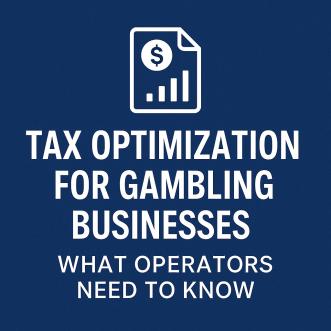Blog

18/07/2025
Tax Optimization for Gambling Businesses: What Operators Need to Know
Understanding the Tax Landscape for Gambling Businesses
The gambling industry is highly regulated and subject to complex taxation rules that vary widely across jurisdictions. Whether an operator is running an online betting platform, a brick-and-mortar casino, or a lottery system, understanding the local and global tax frameworks is vital.
In most regions, gambling is either regulated through national authorities (like the UK Gambling Commission) or state-level bodies (such as U.S. state gambling commissions). Each authority imposes its own set of taxes, licenses, and reporting obligations.
Operators must stay informed about both residence-based taxation (where the company is domiciled) and source-based taxation (where the revenue is generated). In the case of cross-border gambling, both may apply, leading to double taxation if not handled correctly.
Types of Taxes Applicable to Gambling Operations
There are several types of taxes that gambling businesses must account for:
-
Corporate Income Tax: Applied on net profits of the business.
-
Gaming Duties: Levies on gross gambling revenue (GGR).
-
Value-Added Tax (VAT): Applied in certain jurisdictions on specific gambling products.
-
Withholding Tax on Player Winnings: Common in North America and Asia.
-
Excise Duties: Often imposed on slot machines or lottery terminals.
The rate and structure of these taxes differ drastically. For example, Malta has lower gambling taxes than most EU countries, making it attractive for online operators.
Common Challenges in Gambling Taxation
Taxation in the gambling industry comes with several challenges:
-
Complex Compliance Requirements: Especially for online operators serving multiple countries.
-
Frequent Regulatory Changes: Governments often revise gambling laws, affecting tax rates and obligations.
-
Double Taxation Risks: Especially for multinational operators with physical and digital operations.
-
Unclear Definitions: Ambiguities in terms such as "betting activity" or "gaming machine" may lead to disputes.
Navigating these complexities requires up-to-date knowledge and strategic planning.
Legal Frameworks Governing Gambling Taxation
Each country has its own legislative framework for taxing gambling income. For instance:
-
United Kingdom: Enforces a Point of Consumption tax model.
-
United States: Gambling is largely regulated at the state level, with federal oversight for anti-money laundering.
-
Germany and France: Imposes licensing and taxation based on product type (e.g., poker, sports betting).
Compliance with these frameworks is non-negotiable and directly impacts the ability to operate legally and efficiently.
Corporate Structure and Its Impact on Tax Liabilities
How a gambling business is structured greatly affects its tax obligations. Some operators use offshore companies in jurisdictions like Gibraltar or the Isle of Man, which offer favorable tax rates. However, recent global efforts like the OECD’s BEPS (Base Erosion and Profit Shifting) initiative are cracking down on aggressive tax avoidance.
Key considerations include:
-
Place of Effective Management (POEM)
-
Controlled Foreign Corporation (CFC) rules
-
Substance Requirements for demonstrating real economic activity
Strategically setting up holding companies, subsidiaries, and branches can legally minimize tax while maintaining compliance.
Effective Use of Tax Treaties and Offshore Jurisdictions
Double Taxation Avoidance Agreements (DTAAs) play a critical role in minimizing international tax exposure. Gambling companies can benefit from:
-
Reduced withholding tax rates
-
Avoidance of double taxation
-
Tax exemptions for digital exports
However, exploiting these treaties without legitimate economic activity can backfire. Tax authorities now scrutinize treaty shopping and often demand proof of substantial presence.
Transfer Pricing and Intercompany Transactions
For multinational gambling operators, transfer pricing is crucial. This involves setting prices for services, IP usage, and other transactions between affiliated entities.
Key Principles:
-
Use the arm's length principle to justify intercompany pricing.
-
Document all internal agreements and transactions.
-
Benchmark against third-party data to defend pricing models during audits.
Incorrect transfer pricing can lead to penalties, disallowed deductions, and double taxation.
Accounting Methods to Enhance Tax Efficiency
Proper accounting can help defer tax liabilities and improve cash flow. Gambling businesses often choose between:
-
Cash Basis: Revenue recognized when received.
-
Accrual Basis: Revenue recognized when earned.
Strategic use of depreciation, amortization of licenses, and loss carryforwards can significantly reduce taxable income in profitable years.
Managing Player Winnings and Reporting Obligations
Different jurisdictions treat player winnings differently. For example:
-
U.S.: Requires W-2G form filing for large winnings.
-
UK: No tax on player winnings, but operators pay a gambling duty.
-
India: Requires a flat tax deduction at source (TDS).
Gambling companies must implement robust KYC (Know Your Customer) and reporting mechanisms to comply with these rules.
Cross-Border Gambling and International Tax Risks
Operators offering services globally must account for permanent establishment (PE) risks, especially if they:
-
Host servers in foreign countries
-
Employ sales or support staff internationally
-
Run affiliate programs with overseas partners
Failure to recognize PE may trigger unexpected tax bills and penalties.
Tax Planning for Online vs. Land-Based Casinos
Online and land-based operations face unique tax challenges. Online casinos often deal with:
-
Digital Services Taxes
-
Data localization laws
-
Cross-border VAT issues
Land-based casinos, on the other hand, contend with:
-
Property taxes
-
Licensing fees per gaming table/machine
-
Cash handling and AML compliance
Tax planning strategies must be customized based on the nature of the business.
Leveraging Tax Credits and Incentives
Some governments offer tax reliefs to stimulate the gambling and tech sectors:
-
R&D Tax Credits for game development and platform innovation
-
Job Creation Incentives in special economic zones
-
Green Energy Subsidies for eco-friendly casino operations
Operators should routinely review local incentive programs to maximize benefits.
Role of Technology in Tax Optimization
Modern tools can automate tax compliance and reduce errors:
-
ERP Systems for centralized data collection
-
AI-based Audit Tools for flagging anomalies
-
Blockchain for transparent and immutable transaction records
Using such technology improves reporting accuracy and audit readiness.
Working with Tax Professionals and Advisory Firms
Expert advisors are essential for navigating intricate tax codes. Choose advisors with:
-
Gambling industry experience
-
Multinational tax knowledge
-
Strong local networks in key markets
Their insights can uncover hidden risks and opportunities.
Real-World Case Studies: Tax Optimization in Action
-
Bet365 relocated parts of its operations to Gibraltar to benefit from lower tax rates.
-
PokerStars used the Isle of Man for favorable IP tax treatment.
-
888 Holdings structured itself to avoid double taxation in the UK and Israel.
These examples show the power of strategic planning within legal limits.
Regulatory Changes and Their Tax Implications
Recent developments affecting gambling taxation include:
-
OECD’s Pillar Two – A global minimum tax for large companies.
-
EU Digital Services Tax – Impacts cross-border online gambling.
-
U.S. IRS Crackdowns – On unlicensed offshore sportsbooks targeting U.S. players.
Staying ahead of these changes is crucial to maintain compliance and minimize disruption.
Ethical Considerations in Tax Strategy
Tax optimization must be balanced with corporate responsibility. Overly aggressive tactics can damage brand reputation and invite regulatory backlash.
Key principles:
-
Transparency in reporting
-
Compliance with both the letter and spirit of the law
-
Avoidance of secrecy jurisdictions that raise red flags
FAQs about Tax Optimization for Gambling Businesses
Q1: Is it legal to register a gambling company in a tax haven?
Yes, if the company maintains proper substance and complies with local and international laws.
Q2: Do all countries tax online gambling?
No, some countries exempt it, while others impose heavy taxes. It varies widely.
Q3: What is the best jurisdiction for low gambling taxes?
Malta, Isle of Man, and Gibraltar are popular for their favorable tax regimes.
Q4: Can gambling operators claim tax refunds?
In certain cases, such as overpaid VAT or losses carried forward, yes.
Q5: How often do gambling tax laws change?
Frequently. Operators should review legal updates at least quarterly.
Q6: Can player winnings affect the operator’s taxes?
Yes, especially if the jurisdiction requires withholding or reporting obligations.
Conclusion: Building a Sustainable and Compliant Tax Strategy
In the world of gambling, taxation is a moving target. From international treaties to local levies, operators face a maze of requirements. However, with a proactive, ethical, and well-informed approach, gambling businesses can optimize taxes without compromising on compliance.
Investing in expert guidance, staying ahead of regulation, and leveraging technology can turn tax challenges into strategic advantages.

